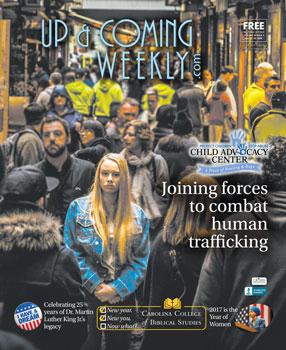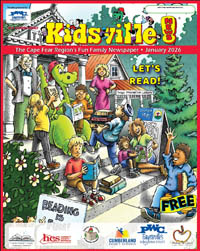 Human trafficking is a worldwide problem. A September 2017 International Labor Organization and Walk Free Foundation report stated, “An estimated 24.9 million victims are trapped in modernday slavery. Of these, 16 million – 64 percent – were exploited for labor; 4.8 million – 19 percent – were sexually exploited; and 4.1 million – 17 percent – were exploited in state-imposed forced labor.”
Human trafficking is a worldwide problem. A September 2017 International Labor Organization and Walk Free Foundation report stated, “An estimated 24.9 million victims are trapped in modernday slavery. Of these, 16 million – 64 percent – were exploited for labor; 4.8 million – 19 percent – were sexually exploited; and 4.1 million – 17 percent – were exploited in state-imposed forced labor.”
Human trafficking is a statewide problem. Last year, statistics from the National Human Trafficking Hotline ranked North Carolina among the top 10 states for human trafficking with 181 cases reported in 2016.
Human trafficking is a local problem. In 2017, multiple human trafficking arrests were made in Cumberland County in February, July, September and October.
Human trafficking is a problem we can work together to combat. Jan. 23 at 6:30 p.m., learn more about human trafficking and how to be a part of the solution at the Human Trafficking Awareness Forum hosted by The Child Advocacy Center along with Fayetteville Alumnae Delta Sigma Theta Sorority, Inc.
The forum will include presentations as well as opportunities to ask the panelists questions.
Covering a variety of perspectives on the topic, the forum panelists include Fayetteville Police Department detective Ronnie Hutchins; Senior Sergeant Adam Farnham, Cumberland County Sheriff’s Office; Pete Twedell, executive director, 5 Sparrows/ Fayetteville Dream Center; Dr. Dean Duncan, research professor at the University of North Carolina Chapel Hill School of Social Work; Pam Strickland, founder and executive director, Eastern North Carolina Stop Human Trafficking Now and committee member, NC Coalition Against Human Trafficking; and a survivor of human trafficking.
Cooperation between local law enforcement agencies and other agencies is vital when it comes to fighting trafficking. Hutchins and Farnham represent Fayetteville and Cumberland County law enforcement organizations. The Fayetteville Police Department and Cumberland County Sherriff’s Office partner with the Child Advocacy Center, which provides a safe, child-friendly place where partner agencies interview, investigate crimes against and provide support for abused children. Dedication and teamwork have led to multiple arrests locally.
“Human trafficking impacts families and communities left behind,” Hutchins said. “It also affects the health of women and children trafficked for sexual exploitation. They are at risk of HIV/AIDS and other sexually transmitted infections and of spreading the diseases among Cumberland County and across the state of North Carolina. Human trafficking brings an increase in gun violence and drug use across our community. It also brings an additional cost to law enforcement to fight this crime and increases medical costs to the community and state to treat victims.”
Hutchins added that while finding and helping victims is a challenge, the fight doesn’t end there. “The biggest challenge I have seen in my career is to keep track of the victims after the arrest of the trafficker,” he said. “The victim will normally move from one area to another and constantly change their phone number. A (human trafficking) case can take two years or more to go to trial. During that time, it is very hard to keep track of or locate the victim. The victim may go back to prostitution or very hard drug use.”
Additionally, Twedell noted, “Human trafficking deteriorates the enormous value of every human life entrapped in the dark injustice by treating people as an object/commodity. (Human trafficking) exists primarily because of two things: ... (First), an enormous demand for sexual services and/or cheap labor and other services and ... (second), a desire to create profit at the expense of people’s freedom. At the North Carolina statelevel, trafficking fuels an underground and illicit economy that provides no positive benefits for our state or economy – and exists in stark contrast to our nation’s principals, which emphasize freedom for every citizen.”
Twedell’s organization, 5 Sparrows, partners with law enforcement and victim service/support organizations to work against human trafficking in the community. As the only local human trafficking-dedicated service organization, 5 Sparrows serves victims of human trafficking, providing full-spectrum support to survivors to enable them to walk a new path.
5 Sparrows also assists law enforcement in the pursuit of trafficking perpetrators, continually promotes human trafficking prevention and awareness and works to change the status quo in the community so that trafficking is no longer acceptable. There is an extensive reading list about the topic at www.5sparrowsfdc.com/reading-list.
Duncan is the principal investigator for Project No Rest. PNR collaborates with the UNC School of Social Work to raise awareness about human trafficking with prevention being the end goal.
One of the most effective ways to do this is to educate the public about how trafficking affects youth in North Carolina. PNR works with state and local government organizations and agencies to not only reduce the number of youth who are trafficked but to help those whose lives have been affected by it. Practical things the organization does include raising awareness and prevention initiatives; fostering cooperation between agencies; developing policies and practices to prevent young people from becoming trafficking victims; improving methods used to identify trafficking victims; and finding safe places for victims to live and heal. Learn more about PNR at www.projectnorest.org.
Strickland founded the Eastern North Carolina Stop Human Trafficking Now, a group of citizens committed to addressing human trafficking within the community by engaging the local citizens. By educating the populace, the organization seeks to reduce the demand for slave labor and sexual servitude, prosecute the perpetrators, and protect victims and potential victims.
Often, trafficking happens in plain sight. Knowing the signs can help save lives. In many cases, trafficking victims are obviously fearful and nervous; they become anxious near law enforcement; they avoid eye contact and may be overly attached to one person or have a person who is overly attached to them. They may appear malnourished and show signs of physical abuse. Trafficking victims often have few personal items, wearing the same clothes day in and day out; they have no control over their money or identification. There may always be a third party present, preventing the victims from speaking for themselves.
“Human trafficking frequently looks like prostitution, but it is not,” said Twedell. “Human trafficking is a sophisticated crime against people who are victims. Recovery for victims of human trafficking requires a complex approach for lasting restoration.”
From a preventative standpoint, Hutchins noted that there are things parents can do. “Parents need to monitor their children’s social media accounts, friends and any changes in their behavior or health,” he said.
To report trafficking, call the national human trafficking hotline at 888-373-7888 or text HELP to 233733.
The Human Trafficking Awareness Forum on Jan. 23 will be held at the Kiwanis Rec. Center, 352 Devers St., at 6:30 p.m. The event is open to the public and is appropriate for any adults who want to learn more about this topic. There is no charge to attend, but registration is requested at Eventbrite.com. Information presented will include how human trafficking is impacting our community, signs for recognizing it and what can be done to help.
For more information, call the Child Advocacy Center at 910-486-9700.

 How to resolve AdBlock issue?
How to resolve AdBlock issue? 








